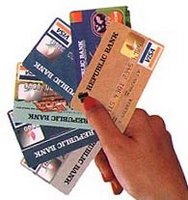 I'm sure this is not a new idea, but I'm a complete moron when it comes to math. Can one of you math whizzes out there break something down for me - (into small words, cause I don't speak this 'Math' of yours) Why can this not be done:
I'm sure this is not a new idea, but I'm a complete moron when it comes to math. Can one of you math whizzes out there break something down for me - (into small words, cause I don't speak this 'Math' of yours) Why can this not be done:What's to keep someone from just getting Y amount of credit on X amount of credit cards, (say, 20 or more cards) and then quitting their jobs forever? Once you have a few cards, they just keep sending you more of them. They WANT you to rack up high balances that you can't pay. And the more cards you have, the more willing they are to send you more. And the more you use a card and pay it on time, the higher your limit rises.
 So you just keep flopping the balances from card to card, paying each card with the others - as long as you meet the minimums, they're more than happy to let you carry a large balance - since that means more interest charges for them. Even if you could not pay a bill with another card directly, you could just withdraw cash from one card, then use it to pay your bill on the others.
So you just keep flopping the balances from card to card, paying each card with the others - as long as you meet the minimums, they're more than happy to let you carry a large balance - since that means more interest charges for them. Even if you could not pay a bill with another card directly, you could just withdraw cash from one card, then use it to pay your bill on the others.Yes, you would die five million dollars in debt, but who cares? I'm guessing that there is a very simple reason why this can't work, or there would be no accountants and math teachers - they'd all be relaxing at home. OK, math whizzes - get to 'splainin. And I want details!
For simplicity, let's say you have three credit cards from companies A, B and C.
ReplyDeleteYou use A to pay off B, B to pay off C and C to pay off A.
Whatever happens, you're always going to owe money on at least one card, which means you're going to be charged interest. In other words, as time goes on, you're going to owe more and more money, as the only time you're not charged interest on a credit card is when your balance is paid in full, IE, you don't owe anything.
Eventually, you're going to owe more than the credit limit of a single card, and end up using two cards to pay off the other one. (A and B to pay off C, B and C to pay off A, and C and A to pay off B)
That will continue until what you owe will be higher than your credit limit...then you're screwed. Basically, you can't pay your credit card bill with a credit card, because you'll owe more than the company is willing to give you.
In simpler terms, even if you have a $200,000 line of credit, as soon as you owe $200,001, interest is going to rack up, and you can't pay it with your cards.
So why not get another card? Well, you can't, you owe too much and your credit rating is in the toilet, so no one will give you another card.
Even if you have a no credit limit ultra-super-platinum card, as soon as you owe them a certain amount of cash, they'll simply cancel the card and call in the debt...in other words, the small print'll get you.
In short, the amount you owe will keep increasing, and the longer you owe, the faster it'll increase (You get charged a percentage of what you owe, so the more you owe, the more you pay)...and no credit company will keep throwing money at you.
Get it?
Oh, and yes, credit card companies do keep sending you cards...when you owe a few thousand.
ReplyDeleteNo credit card company is going to offer credit to someone who is millions is debt.
I don't get it. Credit card companies don't seem to care how much you owe, as long as you're making at least the minimum payments. How else do people end up with 10 cards and 50,000 in debt? Eventually they give up because that can't pay them off and file for bankruptcy.
ReplyDeleteThe question was not about paying them off, but perpetuate the credit forever.
See, I told you I was a math moron.
Evil gnomes.
ReplyDeleteThat's the answer.
Evil gnomes.
You probably could do the credit forever thing if you do lower credit versus a higher amount of credit and live off of necessities only. Then you just keep flipping them around as much as often as possible.
ReplyDeleteScary thought, but it probably could be done.
You're right, MC, except for one point you've missed.
ReplyDeleteIf you attempted to live purely off credit, eventually your minimum payments would be higher than your credit limit.
Minimum payments tend to be a percentage of the overall amount owed. So, if you owe $100,000 on a credit card, and the minimum payment is 10%, your minimum payment is $10,000.
Also, because it's a percentage, the amount you owe increases almost exponentially. If your minimum percentage is 20%, the amount you owe increases by 20% every time the bill comes. (And that's 20% on top of the extra 20% last time, and so on and so on).
The other point is when you owe too much, the credit company will demand payment in full. This might not look like it happens, because people rarely stretch their credit that far, but when a single person owes hundreds of thousands, you bet your ass they'd call in the debt.
As an idea of how quickly this would spiral out of control, if you owed $50,000 on a credit card, and where required to pay 20% of the overall debt every month, by 'flipping credit cards', using one to pay off the other, in 6 months you'd owe $149,299.20
In other words your debt would triple in 6 months, and that deosn't mean it would multiply by a factor of 6 in a year, as time goes on the speed at which your debt multiplys gets faster.
Right, but what about these new offers: "no interest for 12 months on all transeferred balances." If you keep transferring to new cards, the only thing that would stop you is the gradual decline of your credit rating. But the offers keep on coming...
ReplyDeleteyeah. i did that for a few years.
ReplyDeleteit hurts.
You will be happy to know that as of June 1st, 2006 we will be debt free---uh, except the gazillion dollar student loans and our itty bitty neon payment . . .
ReplyDeleteyahoo!